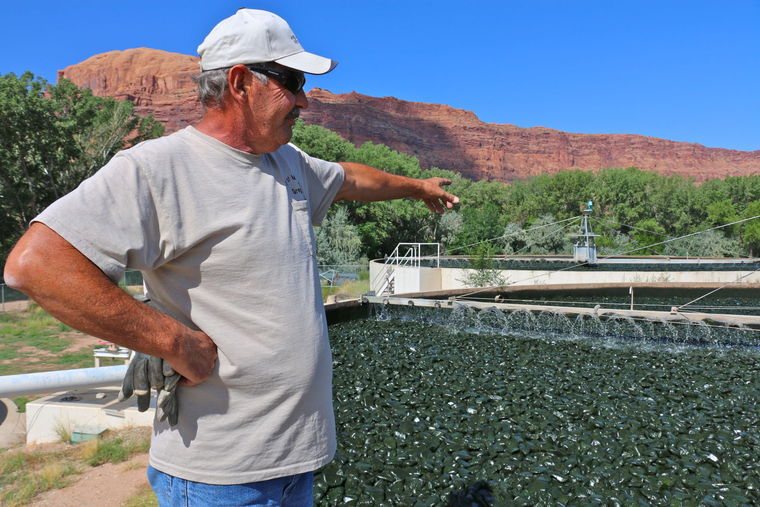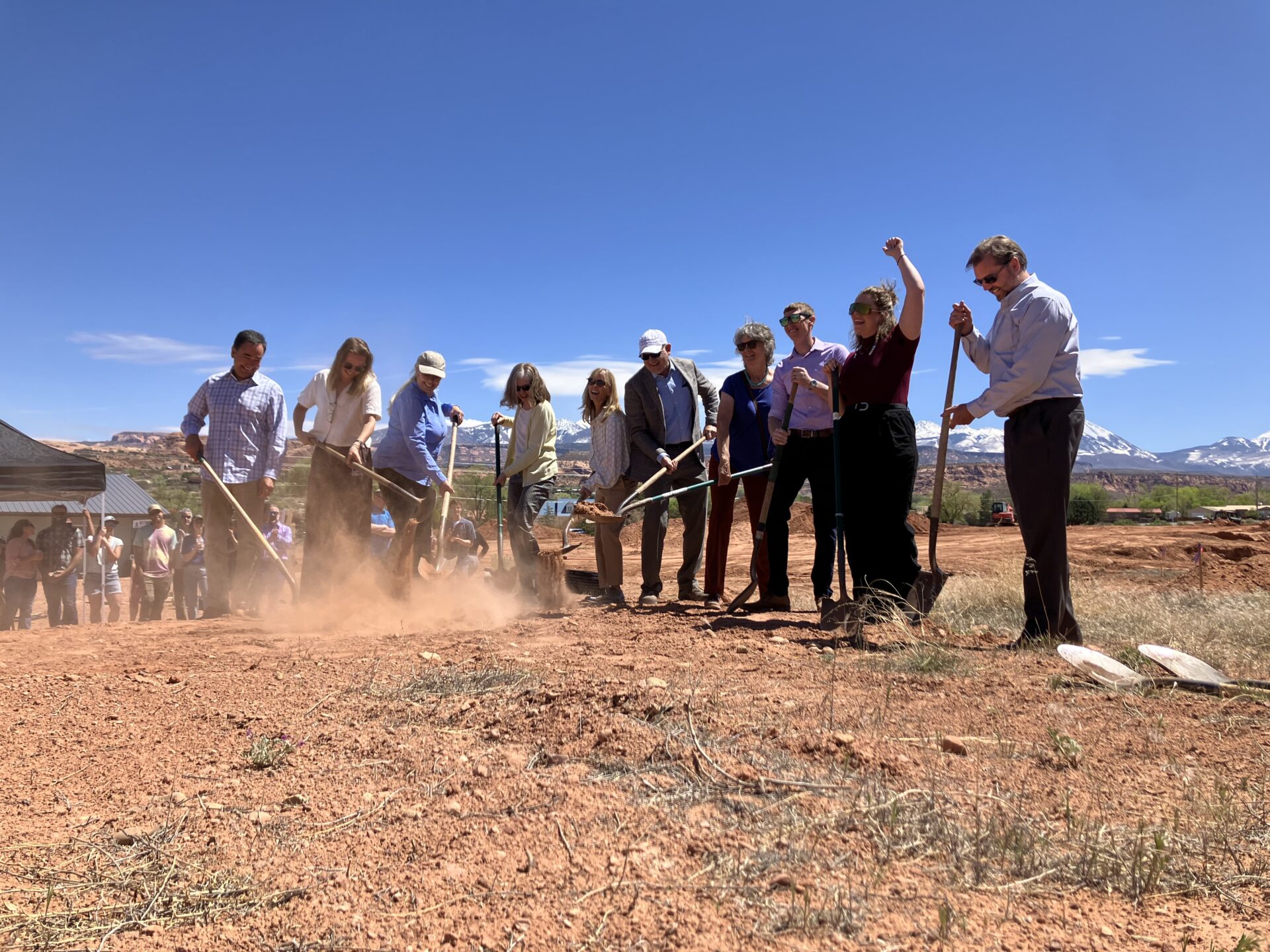Should the City of Moab impose a moratorium on new sewer connections until it can add capacity to its wastewater treatment system?
The Moab City Council is scheduled to consider that option at a special meeting on Tuesday, Nov. 1.
Interim City Manager David Everitt informed the Grand County Building Department this week that the moratorium would take effect as the city moves forward with work on a new wastewater treatment plant. The new plant, which the city plans to build on property near the intersection of 400 North and Stewart Lane, is currently expected to be up and running by mid-2018.
“As it now stands, demands for service from development within the City of Moab and Grand County are likely to outstrip the City’s ability to deliver service,” Everitt said in an Oct. 24 letter to Grand County Building Official Jeff Whitney.
Moab City Council member Kalen Jones said that city officials came up with the proposal after a recent engineering study found that the existing treatment plant is operating at or near capacity. Although it has the potential to affect numerous commercial and residential construction projects, city officials have emphasized that the plan should not be viewed as a blanket moratorium on new development, Jones said.
“Construction is not going to grind to a halt immediately because there is a whole backlog of projects,” he told the Moab Sun News.
If approved, the moratorium would likely include some kind of exception for applicants who obtained building permits by Friday, Oct. 21. The city would give those applicants first priority once additional treatment capacity is available, Everitt’s letter says.
“Even if there is a cutoff … the city will be looking for ways to find more capacity at the existing plant,” Jones said.
Whitney said it’s obvious that the county’s population of year-round residents isn’t even close to contributing to the problem of diminished treatment capacity at the existing plant.
The strain, he said, is coming from the continued growth in visitor numbers, as toilets flush and showers drain at more and more hotels. At the same time, he noted, public land management agencies and haulers are bringing more highly concentrated human waste, or septage, to the facility for treatment.
Jones said the septage accounts for about 15 percent of the waste that the plant currently processes.
“Volume-wise, it’s not that much, but it’s highly concentrated,” he said.
Whitney said the increased demand on the plant is no longer limited to weeks when major special events bring visitors to town.
“Last weekend was crazy,” he said. “We’re filling these motel rooms and we’re filling these RV camp parks.”
Businesses, others seek to minimize impacts on residential construction
Reaction to the city’s letter was swift, as local contractors, developers and Realtors rushed to learn more about the proposal, and how it might affect their projects.
Whitney said the phone at his office has been ringing off the hook since he sent an email alert about the proposal to contractors and others on his list of contacts. But he emphasized that the terms of the proposal aren’t set in stone at this point.
“They’re not sure what form that moratorium is going to take,” he said.
“Nothing’s finalized,” he added. “That has to go to the city council. They’re just putting us on notice.”
Real Estate Company of Moab Broker Rachel Moody is fully aware of the current problems at the existing treatment plant, so she said she understands the position in which the city finds itself.
Even so, Moody is concerned about the impacts that a moratorium could have on residential development in Grand County.
“If we put a stop to building new homes, our housing situation will just keep getting worse,” she said.
Many others share her concerns, she said.
“I know the developers are scared; the contractors are scared; the subcontractors are scared; and the Realtors are scared,” she said.
She suggested that the city should look at alternatives that could increase capacity at the plant, such as limiting the amount of septage it accepts from public land management agencies and private haulers.
“I’m hoping that they can find an interim solution so they don’t have to go to a moratorium,” Moody said.
Jones, who is an architect and developer with interests in the Mulberry Grove subdivison, said the proposal could affect his clients, as well. He plans to ask Moab City Attorney Chris McAnany whether or not he should recuse himself from voting on the proposal.
As the council gears up for its discussion of the issue, Community Rebuilds Executive Director Emily Niehaus and Moab Realtor Joe Kingsley are urging city officials to consider the impacts that a moratorium could have on local affordable housing projects.
Niehaus said a broadly worded moratorium would jeopardize the capacity and growth of her nonprofit group, which helps lower-income residents and families build energy-efficient straw-bale homes.
As an alternative, she suggested that the moratorium could include provisions that benefit deed-restricted housing projects, for example.
“Maybe this is our opportunity to see some growth in the development of affordable housing,” Niehaus told the council during its regular meeting on Tuesday, Oct. 25.
Kingsley said he’s working with a client who is planning to move forward with an affordable housing project. But the man is “scared to death” about the potential delays and cost overruns he could face in the event that the city approves a moratorium on new connections, Kingsley said.
If the city decides that it must implement a moratorium, Kingsley asked that the council impose it on commercial developments, and not on affordable housing projects.
Jones said it’s unclear at this point whether the city can follow Kingsley’s recommendations.
“I’m not sure how much flexibility we’ll have in choosing that balance,” he said.
County resident Bill Love, who has repeatedly called for a moratorium on the development of new condominiums and hotels, said that state regulators have done little to crack down on the plant’s water-quality violations.
The existing plant discharges treated wastewater into the Colorado River, and while it’s currently in compliance with its state permit, any violations of water-quality standards could cost the city up to $10,000 per day.
“The state has the authority to allow them to go over the limits, and the state has been doing that for years,” Love said.
During that time, he said, developers pushed forward with projects that place major strains on the existing plant, which was built in the 1950s and last upgraded in the 1990s.
“They were just out there churning these hundreds and hundreds of condominiums, and the state was just nodding its head,” Love said.
Water-quality violations are most likely to occur during the slower winter months – a time when cooler temperatures can inhibit bacterial activity inside the facility’s biological trickling filter. As temperatures drop again this winter, the potential for water-quality violations could resurface, and the violations could remain a problem as long as the current plant is operating – especially as visitor numbers continue to rise.
However, the plant has violated water-quality standards in more recent months, as well.
Utah Division of Water Quality environmental engineer Dan Griffin told the Moab Sun News that city officials contacted his office after they learned that an unidentified contaminant wound up in the system, affecting its operations.
“They have notified us that there was some sort of incident or release into their system that impacted their treatment plant,” Griffin said.
The change in the plant’s operations was abrupt, he said, and quickly reported.
“They were in compliance – they were doing really well – and they noticed a change in their effluent levels,” he said.
City officials haven’t identified the source of the release, but Griffin said they’re continuing to investigate the incident.
“They aren’t sure if this is someone who may have dumped something before,” he said. “It could be intentional, or it could be unintentional.”
Affordable housing advocates, businesspeople concerned about potential impacts on residential development
I’m hoping that they can find an interim solution so they don’t have to go to a moratorium.




